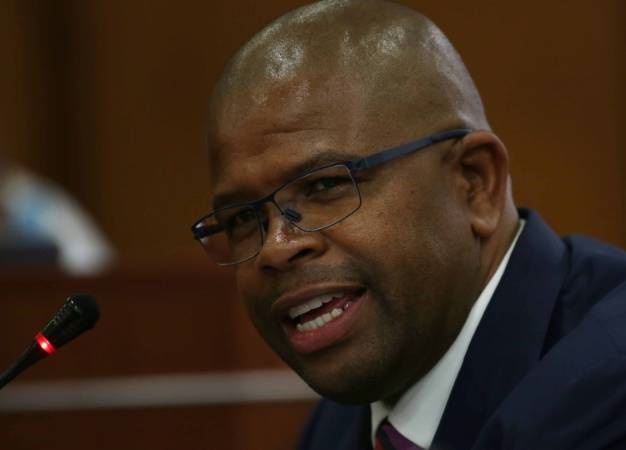


Former Passenger Rail Agency of SA CEO Lucky Montana. (Esa Alexander, Gallo Images, Sowetan, file)
of the properties in upscale Hurlingham and Waterkloof suburbs are in a
state of disrepair, allegedly due to zoning issues.
properties are not registered in Montana’s name.
coincided with the awarding of controversial contracts to Siyangena
Technologies.
Lucky Montana, the former CEO of embattled Passenger Rail
Agency of South Africa, bought a clutch of properties totalling over R36
million in the space of 12 months, starting in 2014, the Commission of Inquiry
into State Capture heard on Friday.
Today, two of the properties in upscale Hurlingham and
Waterkloof suburbs in Gauteng are in a state of disrepair.
An R11-million property in Waterkloof – which sparked an
investigation into Montana’s spending spree, according to evidence heard on
Wednesday – underwent alterations and remains unoccupied six years later. The
R13.5-million Hurlingham property also stands empty.
The purchase of the properties in upscale suburbs
across Gauteng coincided with the awarding of lucrative contracts by Prasa to
Siyangena Technologies, an entity which appeared to have been favoured by
Montana.
The controversial Siyangena contracts have made headlines
numerous times. The Zondo commission has heard, among other things, that
Prasa’s Finance, Capital Investment and Procurement committee played a role in
the approval of a nearly R2-billion contract with Siyangena from an initioal
budget of R517 in 2011, with the contract later being extended further to R2.2
billion without board approval.
Siyangena, which was tasked with installing access gates and
other security-related features at Prasa’s stations, received contracts worth
several billion rand during Montana’s tenure.
Montana was Prasa’s CEO from 2010 until 2015, when he was
forced out amid claims of irregularities in the awarding of lucrative contracts
at the state-owned rail agency.
The commission’s investigator, Clint Oellermann, on Thursday
laid bare details of the movement of large amounts of cash from an account held
by Pretoria lawyer Riaan Van der Walt’s Precise Trade and Invest.
Van der Walt was the sole director of the company, and has
been a regular feature in property dealings involving Montana.
Van der Walt, who has since left the country to settle in
the US, had also acted as a lawyer for Siyangena Technologies.
Oellermann said during the course of his investigation he
had obtained bank statements for Precise Trade and Invest, and that while the
property deals involving Montana were being conducted, there was a parallel
process where Siyangena netted major contracts with the commuter rail
agency.
Generous offer
Siyangena was awarded a multi-phased contract with
Prasa to provide an Integrated Station Access Management System at train
stations across the country, and the tender is the subject of an ongoing legal
review due to claims there was a lack of due process in its awarding of
contracts.
On 30 June 2014, Montana signed a R2.4 billion contract with
Siyangena, a few weeks after the sale of Montana’s house to Van der Walt in
Parkwood, north of Johannesburg, for R6.8 million. In September 2014, Montana
signed an R800 million extension of the June contract without anyone’s
knowledge at Prasa, according to evidence led at the commission.
Van der Walt, through his company, Precise Trade and Invest,
paid up the full R6.8 million despite the property being valued by the
bank at R3.5 million.
Oellermann said he had found it odd that Van der Walt made
such a “generous offer” for the Parkwood property, adding that the
transaction marked the first property transaction between the lawyer and
Montana.
The September contract with Siyangena was also was followed
by a R11 million sale of a Waterkloof property to Montana, although the house
ended up being registered to Van der Walt’s company.
The upscale Waterkloof house is lying in a state of
disrepair, with abandoned improvements to it. The R13.5-million Hurlingham
residence is also unoccupied.
Deputy Chief Justice Raymond Zondo wanted to understand why
the assets were allowed go to ruin.
“It appears that there have been issues with zoning
rights, which prevented the owners from further developing them,”
according to Oellermann’s observation.
Montana was Prasa’s CEO from 2010 until 2015, when he was
forced out amid claims of irregularities in the awarding of lucrative contracts
at the state-owned rail agency.

